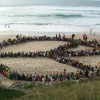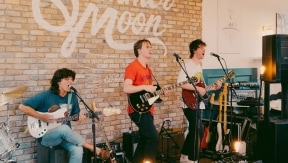
10 songs that tried to change the world
Make people sing to make the world change. Use lyrics and melodies rather than to take to the streets. Against politics, racism, hunger, for class warfare... What could be more effective than music, arguably one of the best remedies to help people change their ways? Be they professions of dashed utopian dreams or total thought-provoking game changers, here are 10 songs that attempt to change the world.
JOHN LENNON
Imagine
Available on Imagine, 1971
One of the most recognized pop songs of all time, Yoko Ono described it as "just what John believed: that we were all one country, one world, one people." With his earlier hit "Give Peace A Chance," Lennon had already tackled making the world a better place. But thanks to producer Phil Spector’s version of the song (one that Lennon later revealed he found to be sugar-coated), coupled with the universality of the tune, the message of peace rang true even louder than Give Peace a Chance. According to Lennon, this anti-all-song ("anti-religious, anti-nationalist, anti-norm and anti-capitalist") could have been "The manifesto of the Communist Party." Today, not far from the Dakota Building where John Lennon was murdered, stands the Strawberry Field’s Memorial, in Central Park where the words Imagine are immortalized.
BOB DYLAN
Blowin’ In The Wind
Available on The Freewheelin’ Bob Dylan, 1963
WOODY GUTHRIE
This Land Is Your Land
Available on This Land Is Your Land, 1944
Ironically, certain American children are still learning the song in school. Although it remains unknown, the songs original lyrics might have been written as a critique to politics and inequality and in response to the popular and ultra-patriotic God Bless America of Irving Berling, sung by Kate Smith that was popular at the time. Inspired by a Native American principle that land does not belong to any one particular person and affirming his disgust for individual property, supporting the poor and unemployed, Guthrie made This Land a secular hymn and one that was wrapped in political dynamite. It was later sung and made famous by Pete Seeger.
MARVIN GAYE
What’s Going On
Available on What’s Going On, 1971
Having hit rock bottom after the death of singer Tammi Terrell and fresh off a failed attempt to become a pro footballer, Gaye was solicited by Al Cleveland and Renaldo Benson, members of the Four Tops, to record the 1971 hit "What's Going On." Having originally been offered to the group The Originals, Gaye sings a call for tolerance when he belts out "Brother, brother,...” which also acted as a nod to his brother Frankie, who served three years in Vietnam. The song also delivers a powerful message of peace to the random listener, allowing the listener to briefly forget the naivety in the words: "War is not the answer, only love can conquer hate." An eternal groove ...
PETE SEEGER
We Shall Overcome
Available on At Carnegie Hall, 1963
Without a doubt We Shall Overcome is one of the most emblematic songs of the civil rights movement in the United States. A tune inspired from Christian Gospel composer Charles Albert Tindley, We Shall Overcome was the peace march and anti-war demonstration anthem, even used during the famous march for Martin Luther King in 1963 by a crowd of more than 300,000 people. The song was not only recorded by Pete Seeger, a veteran of the folk movement, Bob Dylan and Joan Baez but also by Joe Glazer, Frank Hamilton, Mahalia Jackson and Bruce Springsteen, proving that the posterity of the song's lyrics were particularly alive in for generations to come.
THE JIMI HENDRIX EXPERIENCE
The Star-Spangled Banner
Available on Live at Woodstock, 1969
Played and captured for all posterity at the infamous Woodstock, the American National Anthem, peppered with distortion, feedback and vibrato, denounces an American presence in Vietnam. Hendrix’s guitar playing techniques liken to human cries, bullets hissing, and the horror of war. A mind-boggling sonic experience, one of the greatest instrumental pieces in rock history is also one of the first to hint to possible exacerbated patriotism of America. Note the drums, though present on the original track, have almost completely disappeared from most mixes made after Woodstock, an attempt to promote a rock-like sound and highlight the triptych guitar-bass-drums. Respect!
U2
Sunday Bloody Sunday
Available on War, 1983
The Edge (stage name of David Howell Evans, lead guitarist of the band) plays the overpowering riff of the first song on the album War (the Irish band's most popular album). Initially, the band did not intend it to be a protest song. Over time, the song has become U2’s most openly political song. It tells the story of the 1972 events in the town of Derry, commonly referred to as Bloody Sunday. Fourteen peaceful demonstrators, half of whom were under the age of 19, were killed by the British army following a march demanding civil rights and the end of political discrimination in Northern Ireland, as well as the end of political, economic and social discrimination of Christians by the Catholic authorities.
JAMES BROWN
Say It Loud – I’m Black and I’m Proud
Available on Say It Loud – I’m Black and I’m Proud, 1969
In 1968 America had not yet reconciled with its history, and only a few months after the assassination of Pastor Martin Luther King, James Brown sang: "Say it loud! And they [children] answer: "I am black and I am proud!” The message was addressed directly to future generations, but also to the hundreds of thousands of African-Americans who had been forced to ignore their anger. Oddly, the song was recorded on the outskirts of Los Angeles, and the majority of children recruited for the track were Caucasien or Asian, few being African-American. The song became a highlight of the dynamic artist’s concerts, but cost him a part of his "crossover" audience, as he acknowledged in his autobiography: "After that, the majority of the audience was black, but I don’t regret anything." For fear that his message was misinterpreted, Brown stopped playing it. Countless groups have since used extracts of the song.
MIDNIGHT OIL
Beds Are Burning
Available on Diesel And Dust, 1987
Midnight Oil’s masterpiece carries a strong ecological message even at a time when rock was on the decline. Composed after the group had spent a whole year in the Australian desert with the Aborigines, the album "Diesel And Dust" included songs as strong as Dream World or Put Down That Weapon and wanted to make people aware of the fragility of this world and of those who inhabit it. Beds Are Burning, the band's best-known song, served as a standard, and is very frequently cited in the 500 songs that made rock history.
RAGE AGAINST THE MACHINE
Killing In The Name
Available on Rage Against The Machine, 1992
What could be stronger than brandishing rage against the system in the band and album name? Absolutely nothing if the album’s single is so powerful. Released in 1992 in the States, Killing In The Name did not reach Europe until 1994. The song, like many other RATM hits, denounces the links between the political powers and the Ku Klux Klan. Zack de la Rocha poured out his anger and millions of fans around the world responded.
Published on: 1 grudnia 2019



